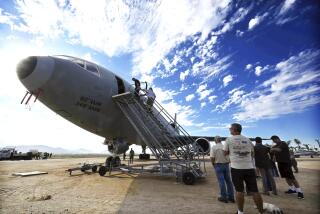Sister Searches for Final Word on MIA Brother : Military: She wants to know what happened to Capt. Halbert C. Unruh after he was shot down over North Korea in 1951. Documents are unclear on whether he became a prisoner in the Soviet Union.
- Share via
ROSSMOOR — Until two years ago, Darlene Ticehurst believed what the United States government told her about her brother, an Air Force pilot whose plane apparently was shot down over North Korea in 1951.
Though shocked and saddened at the news, she accepted a Department of Defense explanation that her only brother had disappeared on a mission and was presumed dead.
Then in January, 1993, she received a letter from the Air Force Casualty Office saying her brother’s name had turned up in Russian files and more information would be forthcoming.
“I figured if they learned more they would let me know,” Ticehurst said.
They didn’t.
What Ticehurst learned came from a newspaper she read at breakfast several months later. There, just below a headline was her brother’s name, Capt. Halbert C. Unruh, listed as one of three Californians among the 77 American pilots the government believed the Russians captured in the Korean War. Despite Defense Department officials’ suspicions that the Russians transported Unruh to the Soviet Union for interrogation and that they have information in their files about his demise, Ticehurst has been able to learn little more than what she read in the newspaper that day.
So it is with mixed feelings that Ticehurst heads to Washington today for the dedication of the Korean War Veterans Memorial, which honors the 54,246 who died in the three-year conflict.
“It is a wonderful tribute to all the men and women who served in the Korean War,” said Ticehurst, 70, of Rossmoor. “But there are still a number of us out there--particularly those names that appear in the files of the Russians--who still have questions about the fate of their loved ones.”
What information she has received has raised more questions.
The Department of Defense POW-MIA Office in March sent Ticehurst a letter that said her brother’s name was found in the records of the Russian 64th Fighter Aviation Corps--an elite group that sought information on American F-86 planes and their pilots. Those records said Unruh perished in a crash above Hakusen.
But the letter went on to say the United States received copies of 46 debriefings of American pilots captured during the war that had been conducted by the Chinese and North Koreans and transcribed in Russian. It was unclear what role the Russians played in the debriefings.
U.S. authorities contend nine debriefings were missing from the collection, and a government analyst said he believed one concerned Unruh.
At a 1993 meeting of a joint U.S. and Russian task force that investigates reports on missing soldiers, Lt. Col. Robert Freeman said the Russian government “should be able to find information on [Capt. Charles E. McDonough, Capt. Unruh and Staff Sgt. Louis Bergman] and six other missing Americans.”
*
Russian officials allowed an American officer to inspect the files , and he was convinced there was no additional information. Still, Defense Department analysts remained skeptical.
(The McDonough family learned late in 1994 through Russian documents and another prisoner-of-war that McDonough had been captured and died two weeks later of injuries suffered in the crash of his plane. There was no information available on Bergman.)
Though she said she is not bitter about what happened to her brother, nor the length of time it has taken to get information, Ticehurst said she is surprised that the United States has not received a concrete answer about what happened to her brother after his plane was downed.
“It is difficult to understand how we can pour billions of dollars into aid for the Russians and yet have no power to demand information and accept stories that don’t gel,” Ticehurst said.
Unruh was born in Kansas in 1922. He enlisted in the Air Force in 1942 and was stationed in Japan as part of the U.S. occupation after World War II. In 1951, he wrote home that he had completed his 50th mission and was returning to the United States unless something came up.
It’s not clear why Unruh was flying over North Korea, but it was his last scheduled mission.
While in Washington, Ticehurst will meet with other families who feel they have been forgotten in the shadow of the Vietnam War. Ticehurst is one of 600 members of the Korean War-Cold War Family Assn. headquartered in Coppell, Tex. The group was formed by three daughters of captured U.S. servicemen.
Ticehurst said the group has been a great help and solace to her.
“None of us believe we have relatives living in Russia,” said Ticehurst. “We just want some closure.”
As for the government, Ticehurst said, “I hope that they continue to do all they can do, and I will continue to do the same. We want to find the information that someone has somewhere.”
More to Read
Sign up for Essential California
The most important California stories and recommendations in your inbox every morning.
You may occasionally receive promotional content from the Los Angeles Times.













